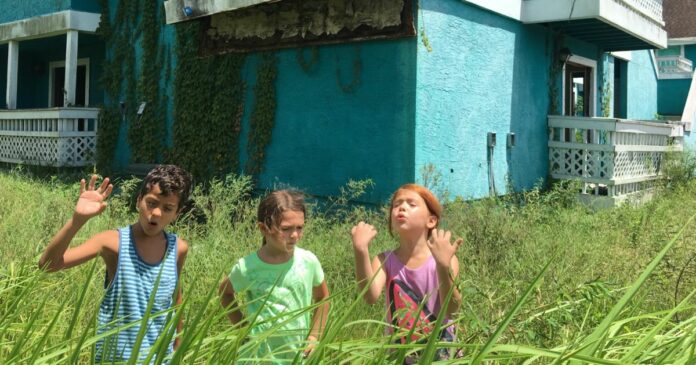In The Florida Project, writer /director/editor Sean Baker takes us to a place most of us would only get stuck in if we took the wrong exit on a trip to Walt Disney World. It is a neighborhood of huge, bright orange juice stands, cheap Disney knock-offs sold beneath the spreading arms of a garish plaster wizard, gun shops that advertise “shoot real machine guns,” discount gas stations, abandoned condominium projects, and a couple of super-cheap motels ironically-named Magic Castle and Future Land. Both places are inhabited by people who wish they were somewhere else, but are still glad to have a place to sleep, clean sheets and towels, and a swimming pool. Many residents are “semi-permanent” meaning that they have to move out of their rooms for one night every month so the motels won’t lose their licenses.
The first people we meet are two six-year-old best friends named Moonee (Brooklynn Prince), and Scooty (Christopher Rivera) whose loud cursing echoes off the motel’s purple stucco walls. It is about a week into summer vacation, and the pair have tried just about anything they can think of to prevent getting bored. Their latest adventure is to run to the balcony at the motel next door and spit onto a car parked below. When one spitball lands on Jancey (Valeria Coto), her grandmother drags the kids with her to confront Moonee’s mom, Hailey (Bria Vinaite), a skinny, overly tattooed, bleached blonde in cutoff blue jeans. We quickly learn where Moonee acquired all her sassy, “it wasn’t me” attitudes.
Hailey struggles to make $35 each and every day to pay for the room by hawking fake perfumes to tourists, caging free meals from the back door of the restaurant where Scooty’s mother works, or crashing the complimentary breakfast buffet at an upscale motel closer to the amusement parks.
The Magic Castle’s manager, Bobby (Willem Dafoe), has met dozens of single moms with young daughters over the years, and clearly recognizes that Haley is on a downward spiral. We learn a great deal about Bobby through a series of relatively innocuous interactions with the motel guests and staff. Bobby is much more than a manager—he picks out the motel’s distinctive purple paint job (at a cost of $20,000), cleans the pool after Moonee and Scooty attempt to bring a dead fish back to life in the chlorinated water, and makes things work out smoothly for the honeymoon couple who booked their wedding night at his motel instead of the “real” Magic Castle in Disney World. When he is unable to repair the ice-maker, he hires his estranged son to help him push and shove the broken machine down the corridor and into the elevator, and since he is the manager, Bobby is the one tasked with taking care of things that need “discrete” attention, like removing a bed-bug infested mattress or giving a prostitute and her customer the bum’s rush.
The Florida Project’s stylistic approach won’t please everyone. Baker and his cinematographer Alexis Zabe utilize hand-held cameras to follow Moonee and her friends on their adventures, and Bobby doing his job. The film is edited into a summer’s-worth of slices of these people’s lives. As such, there is no real story arc. No easily identified beginning, middle and end. In fact, after the last shot, the screen turns black and the credits begin to roll. No music, no out-takes, no pitch for a sequel. And the gritty realism of living on the edge isn’t sugar-coated (except by all the pancake syrup and soft ice-cream Moonee consumes). The language is raw, the verbal and physical confrontations are bloody, the pool-side nudity is candid (in an unexpected way), and most important, because we get to know them through a series of episodic moments throughout the summer, the characters attain a life greater than what we see on screen.
Comments? E-mail gi*********@co*****.net
51
F
Healdsburg
April 16, 2025








